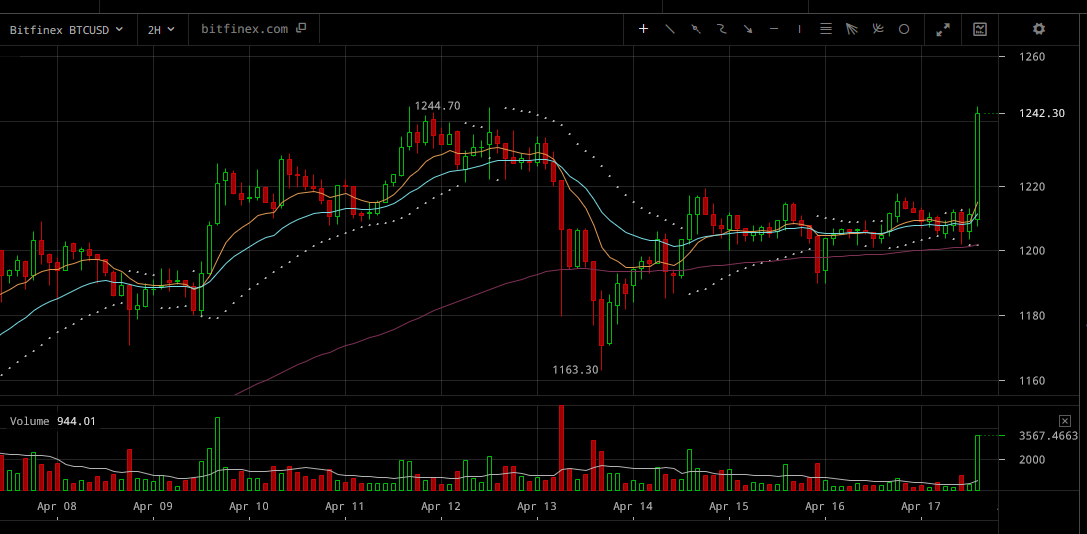Bitcoin Exchange Bitfinex Stops Accepting Fiat Deposits

Bitfinex has announced today that bank transfers will no longer be processed, just days after the exchange said there will be USD withdrawal delays, in a development that raises fundamental questions regarding the exchange’s solvency or its ability to continue operating. In a statement , Bitfinex says:
Beginning April 18, 2017, all incoming wires to Bitfinex will be blocked and refused by our Taiwan banks. This applies to all fiat currencies at the present time. Accordingly, we ask customers to avoid sending incoming wires to us until further notice, effective immediately.
The exchange says they are working on “alternative solutions for customers that wish to either deposit or withdraw in fiat,” but this announcement is made just days after Wells Fargo, an intermediary American international bank, stopped processing transfers from Bitfinex’s Taiwanese banks. On April 13th 2017, the exchange stated :
“Bitfinex is currently experiencing delays in the processing of outbound USD wires to customers. The normal channels that we have been operating through in the past are currently unavailable. Alternative channels are being opened to solve these transmission delays; however, the complexity and scale involved mean that it is taking some time to return to normal withdrawal velocities. Consequently, customers requesting USD wires should expect delays as we work to normalize the withdrawal process.”
The exact reasons for Wells Fargo’s actions are not known, but CFTC took action against Bitfinex last year, fining them $75,000 for “offering illegal off-exchange financed retail commodity transactions and failing to register as a futures commission merchant.”
The exchange remains unregulated as far as it is known despite the fine, further experiencing an alleged hack in August 2016 of some $140 million at bitcoin’s current valuation. It may be the case, therefore, that banks are now entering into the fray to enforce CFTC’s action.
However, while Wells Fargo’s action can so be explained, the latest move by Taiwanese banks is somewhat surprising as the exchange now appears to be fully cut off from the monetary system in significant reminiscence of the MT Gox’s situation three years ago which led to its bankruptcy. Mark Karpeles, the then MT Gox CEO, commenting on the current Bitfinex situation, publicly stated:
“A few years ago, MtGox had its international wires blocked by an intermediate bank. This caused a lot of additional costs as it was difficult to work around such blocks, and intermediate banks would also pressure our Japanese banks to close our accounts.”
It may be the case that Taiwanese banks have come under pressure to cut off Bitfinex’s monetary transfers potentially under threats by Wells Fargo to cut off their relationships if they fail to do so.
If that is indeed the case, and of course this is very much a developing story, then America is clearly sending a warning to all exchanges across the world that they need to comply with, at least, local regulations by getting a license with relevant authorities or they may be cut off the monetary system.
Bitcoin’s price at Bitfinex instantly reacted to the news, seemingly detaching from reality in jumping some $40 in seconds. The reason is probably because the only way to get out of the exchange at current times may be by buying bitcoins, thus artificially inflating the price.

Logically, the same should apply to other currencies traded on the exchange, such as eth or litecoin, but Bitfinex has less volume than other exchanges for both, thus price discrepancy appears minimal, while it has the highest volume of any exchange for bitcoin according to Cryptowatch.
This latest news, while surprising, was within the range of predictability, with CCN.com publishing an editorial earlier today asking whether Bitfinex is in serious trouble. A cut-off from their local banks was not expected, but the exchange has had many red flags, with the latest announcement seemingly making it clear that the platform is experiencing significant difficulties which may lead to a very dangerous situation, including bankruptcy.
Featured image from Shutterstock.